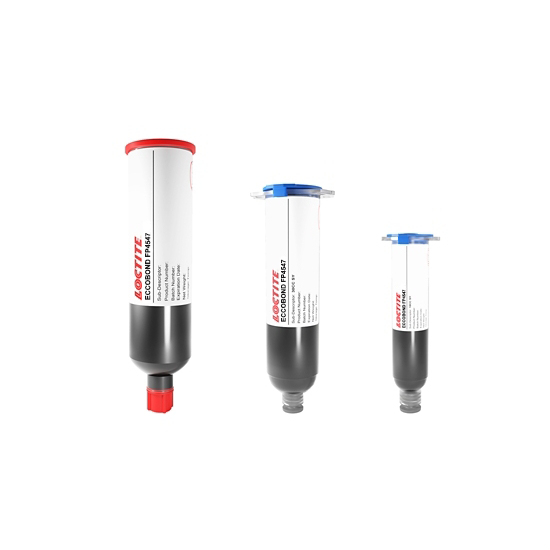LOCTITE ECCOBOND FP4547
Harmonization Code : 3907.30.00.85 | Polyacetals, other polyethers and epoxide resins, in primary forms; polycarbonates, alkyd resins, polyallyl esters and other polyesters, in primary forms : Epoxide resins : Other
Main features
- Enhanced adhesion
- Rigid, low stress seal
- High purity
Product Description
LOCTITE ECCOBOND FP4547 liquid epoxy underfill is designed to provide enhanced adhesion to integrated circuit passivation materials. This material is formulated to quickly underfill devices at 90 to 120°C substrate temperature, with as little as a 2 to 3 mil gap.
When fully cured, the material forms a rigid, low stress seal that dissipates stress on solder joints and extends thermal cycling performance. LOCTITE ECCOBOND FP4547 also exhibits low moisture absorption for improved JEDEC performance.
Recommended Cure Schedule
- 30 minutes @ 165°C
Technical Specifications
| Thermal Properties | |
| Glass Transition Temperature (Tg) Glass Transition Temperature (Tg) The glass transition temperature for organic adhesives is a temperature region where the polymers change from glassy and brittle to soft and rubbery. Increasing the temperature further continues the softening process as the viscosity drops too. Temperatures between the glass transition temperature and below the decomposition point of the adhesive are the best region for bonding. The glass-transition temperature Tg of a material characterizes the range of temperatures over which this glass transition occurs. | 135 °C |
| Physical Properties | |
| Viscosity Viscosity Viscosity is a measurement of a fluid’s resistance to flow. Viscosity is commonly measured in centiPoise (cP). One cP is defined as the viscosity of water and all other viscosities are derived from this base. MPa is another common unit with a 1:1 conversion to cP. A product like honey would have a much higher viscosity -around 10,000 cPs- compared to water. As a result, honey would flow much slower out of a tipped glass than water would. The viscosity of a material can be decreased with an increase in temperature in order to better suit an application | 18,000 mPa.s |



